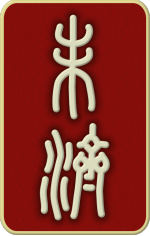
未济 Wèi jì Almost there (Not yet fulfilled) [hexagram 64]


Fire over Water
 Fire element
Fire element
Lunar month: 11 ; Host (controlling) line : 5
The Decision
Almost successful. The young fox has almost completed its crossing but wets its tail. Not advantageous.
‘Almost successful’ – there is weakness at the middle. ‘The young fox has almost completed its crossing’ – not quite past the middle. ‘Wets its tail. Not advantageous’ – an inappropriate place even though weak and strong correspond.
未济 亨 小狐汔济 濡其尾 无攸利 Wèi jì hēng xiǎo hú qì jì rú qí wěi yōu lì
未济“亨”,柔得中也.“小狐汔济”,未出中也. “濡其尾,无攸利”,不续终也.虽不当位,刚柔应也 Wèi jì “ Hēng”, róu dé zhòng yě.“ Xiǎo hú qì jì”,wèi chū zhōng yě. “ Rú qí wěi, wú yōu lì”, bù xù zhōng yě. Suī bù dàng wèi, gāng róu yīng yě
The Image
Fire over water form ‘Almost there’. The wise carefully discern the nature of things and their proper place.
火在水上, 未济. 君子以慎辨物居方 Huǒ zài shuǐ shàng, wèi jì. Jūn zǐ yǐ shèn biàn wù jī fāng
Line Change 1
‘Wetting the tail’ – embarrassing.
‘Wetting the tail’ – height of neglectfulness
初六: 濡其尾, 吝 Chū liù: rú qí wěi, lìn
濡其尾, 亦不知极也 Rú qí wěi, yì bù zhī jí yě
Line Change 2
Applying brakes. Remaining steadfast brings good fortune.
The good fortune of the second ‘nine’ comes from steadfastness – it is central and advance is correct.
九二: 曳其轮, 贞吉 Jiǔ èr: yè qí lún, zhēn jí
九二贞吉, 中以行正也 Jiǔ èr zhēn jí, zhòng yǐ xíng zhèng yě
Line Change 3
Almost there – continuation brings trouble but advantageous to go on a great journey.
‘Almost there – continuation brings trouble’ – an inappropriate position.
六三: 未济, 征,凶, 利涉大川 Liù sān: wèi jì, zhēng, xiōng, lì shè dà chuān
未济, 征凶, 位不当也 Wèi jì, zhēng xiōng, wèi bù dàng yě
Line Change 4
Remaining steadfast brings good fortune and regrets vanish. Motivated as if conquering a kingdom of demons. After three years rewards are bestowed by the great country.
‘Remaining steadfast brings good fortune and regrets vanish’ – the aims are met.
九四: 贞吉, 悔亡. 震用伐鬼方, 三年, 有赏于大国 Jiǔ sì: zhēn jí, huǐ wáng. Zhèn yòng fá guǐ fāng, sān nián, yǒu shǎng yú dà guó
贞吉, 悔亡, 志行也 Zhēn jí, huǐ wáng, zhì xíng yě
Line Change 5
Steadfast and persistent – gives good fortune with no regrets. The brilliance of the young serves as an example. Remaining sincere brings good fortune.
‘The brilliance of the young’ – the spreading of the brightness gives good fortune.
六五: 贞吉, 无悔. 君子之光,有孚, 吉 Liù wǔ: zhēn jí, wú huǐ. Jūn zǐ zhī guāng, yǒu fú, jí
君子之光, 其晖吉也 Jūn zǐ zhī guāng, qí huī jí yě
Line Change 6
Self-assuredly drinking wine. No fault. But if over-indulgent will fall short of what is right.
‘Over-indulgent’ – a lack of self-control.
上九: 有孚于饮酒, 无咎.濡其首. 有孚, 失是 Shàng jiǔ: yǒu fú yú yǐn jiǔ, wú jiù. Rú qí shǒu. yǒu fú, shī shì
饮酒濡首, 亦不知节也 Yǐn jiǔ rú shǒu, yì bù zhī jié yě
The full set of 64 English translations is available in our new book 'Book of Changes - Deciphered' ➚.